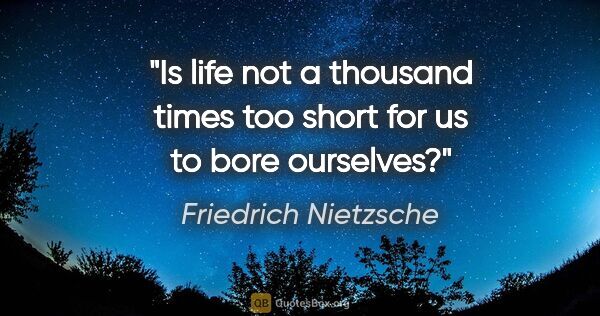
Friedrich Nietzsche quotes about time
Deutsch Philosopher, Writer October 15, 1844 – August 25, 1900
Friedrich Nietzsche quotes in frenchFriedrich Nietzsche quotes in russian
Friedrich Nietzsche quotes in german
Cite this Page: Citation
Quotes
My dear friend, what is this our life? A boat that swims in the sea, and all one knows for certain about it is that one day it will capsize. Here we are, two good old boats that have been faithful neighbors, and above all your hand has done its best to keep me from "capsizing"! Let us then continue our voyage—each for the other's sake, for a long time yet, a long time! We should miss each other so much! Tolerably calm seas and good winds and above all sun—what I wish for myself, I wish for...
Friedrich Nietzsche

What, if some day or night a demon were to steal after you into your loneliest loneliness and say to you: 'This life as you now live it and have lived it, you will have to live once more and innumerable times more' ... Would you not throw yourself down and gnash your teeth and curse the demon who spoke thus? Or have you once experienced a tremendous moment when you would have answered him: 'You are a god and never have I heard anything more divine.
Friedrich Nietzsche
What if a demon were to creep after you one night, in your loneliest loneliness, and say, 'This life which you live must be lived by you once again and innumerable times more; and every pain and joy and thought and sigh must come again to you, all in the same sequence. The eternal hourglass will again and again be turned and you with it, dust of the dust!' Would you throw yourself down and gnash your teeth and curse that demon? Or would you answer, 'Never have I heard anything more divine'?
Friedrich Nietzsche
I do not believe that an “impulse
to knowledge” is the father of philosophy; but that another impulse, here as elsewhere, has only made use of knowledge (and mistaken knowledge!) as an instrument. But whoever considers the fundamental impulses of man with a view to determining how far they may have here acted as INSPIRING GENII (or as demons and cobolds), will find that they have all practiced philosophy at one time or another, and that each one of them would have been only too glad to look...
Friedrich Nietzsche
The slow arrow of beauty. The most noble kind of beauty is that which does not carry us away suddenly, whose attacks are not violent or intoxicating (this kind easily awakens disgust), but rather the kind of beauty which infiltrates slowly, which we carry along with us almost unnoticed, and meet up with again in dreams; finally, after it has for a long time lain modestly in our heart, it takes complete possession of us, filling our eyes with tears, our hearts with longing. What do we long for...
Friedrich Nietzsche
But grant me from time to time—if there are divine goddesses in the realm beyond good and evil—grant me the sight, but one glance of something perfect, wholly achieved, happy, mighty, triumphant, something still capable of arousing fear! Of a man who justifies man, of a complementary and redeeming lucky hit on the part of man for the sake of which one may still believe in man!
Friedrich Nietzsche
Living in a constant chase after gain compels people to expend their spirit to the point of exhaustion in continual pretense and overreaching and anticipating other. Virtue has come to consist of doing something in less time that someone else. Hours in which honesty is permitted have become rare, and when they arrive one is tired and does not only want to "let oneself go" but actually wishes to stretch out as long and wide and ungainly as one happens to be... Soon we may well reach the...
Friedrich Nietzsche
He who has attained the freedom of reason to any extent cannot, for a long time, regard himself otherwise than as a wanderer on the face of the earth - and not even as a traveler towards a final goal, for there is no such thing. But he certainly wants to observe and keep his eyes open to whatever actually happens in the world; therefore he cannot attach his heart too firmly to anything individual; he must have in himself something wandering that takes pleasure in change and transitoriness.
Friedrich Nietzsche
I should like to direct the attention of artists. A constant producer, a man who is a "mother" in the grand sense of the term, one who no longer knows or hears of anything except pregnancies and childbeds of his spirit, who has no time at all to reflect and make comparisons with regard to himself and his work, who is also no longer inclined to exercise his taste, but simply forgets it, letting it take its chance of standing, lying or falling -- perhaps such a man at last produces works on...
Friedrich Nietzsche
[Dionysos'] being torn into pieces, the genuine Dionysiac suffering, is like a transformation into air, water, earth, and fire, so that we are to regard the state of individuation as the source and primal cause of all suffering.... In the view described here we already have all the constituent elements of a profound way of looking at the world and thus, at the same time, the doctrine of the Mysteries taught by tragedy: the fundamental recognition that everything which exists is a unity; the...
Friedrich Nietzsche
Man has been reared by his errors: first he never saw himself other than imperfectly, second he attributed to himself imaginary qualities, third he felt himself in a false order of rank with animal and nature, fourth he continually invented new tables of values and for a time took each of them to be eternal and unconditional...If one deducts the effect of these four errors, one has also deducted away humanity, humaneness, and 'human dignity'.
Friedrich Nietzsche
Popular Author
Related Authors
-
 Albert Camus Philosopher, Writer
Albert Camus Philosopher, Writer -
 Campbell Scott Actor
Campbell Scott Actor -
 Friedrich Nietzsche Philosopher, Writer
Friedrich Nietzsche Philosopher, Writer -
JR
Jean-Jacques Rousseau Philosopher, Writer
-
 Jean-Paul Sartre Philosopher, Writer
Jean-Paul Sartre Philosopher, Writer -
JH
Jeff Hawkins Inventor
-
KM
Karl Marx Philosopher, Writer
-
 Michel de Montaigne Philosopher, Writer
Michel de Montaigne Philosopher, Writer -
PK
Pauline Kael Critic
-
RM
Robert M. Pirsig Philosopher, Writer

